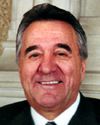Mr. Speaker, I would like to begin by congratulating the member for his speech. As he knows, there have not been too many times I have risen in the House to say that. The member deserves the respect of members of the House for the sincerity he has put forward in trying to address some of the very serious problems that exist on reserves across the country.
I too spent some time on reserves in my younger days with the department of lands and forests in Ontario. I saw the poverty. I saw brand new schools being built and all the windows smashed out the very next day. The lack of self-respect, the lack of self-esteem, the lack of jobs that existed in northern Ontario, not in western Canada, are still a problem in too many areas.
I have often thought it is a real travesty that a nation as wealthy as Canada, blessed with its natural resources and financial capabilities, has a people within its boundaries who live life in what could only be described as third world conditions in many instances.
The member will probably not be surprised to know that I disagree with his solution to the issue. I appreciate the fact that it is not his solution, that it has come from the grassroots. I do not mind saying that I disagree with them in using this particular issue as a solution. Let me say why.
I had a private member's bill in the Ontario legislature that would have abolished the office of the ombudsman in the province of Ontario. The reason was that from the days when the ombudsman's office was created in our province, it grew from being a complaint or resolution mechanism to becoming a bureaucracy that was, and in Ontario still is, out of control. It became nothing more than a court of last resort.
I recognize it is different with the folks on the reserves the member is talking about, but there are similarities. Once that is set up it becomes a no at this level and a no at that level but there is always the ombudsman. It just becomes one further process in the bureaucratic jungle with which people have to deal.
My argument to eliminate the ombudsman's office in the province of Ontario was that elected representatives were the ombudsmen. We should be the ones to raise issues. To suggest that the ministry is not accountable to parliament is simply not a fact.
The member may not like the action and there may be things that need to be done to improve it, but I would have thought in all honesty that at the end of the member's speech, for which I did congratulate him, he would have said that therefore he supports the Nisga'a treaty, as an example.
What about a long term solution? This is not an overnight quick fix, the setting up an office and appointing an ombudsman. There would be great criticism about how such a person gets appointed or who it is. There will be accusations of partisanship. All that will take place.
The reality is that we should be working with our first nations to develop programs around self-government and partnership, and I believe the ministry and the minister are doing it. They may want to establish an ombudsman. I appreciate it may not be going fast enough, but Nisga'a is a clear example, whether the member likes the fine print or the details, of a self-government treaty that it is totally beyond my comprehension. I do not understand why the Reform Party opposes something like ensconcing democratic principles in a first nation that has been debating the issue for over 100 years.
I do not want to fight the Nisga'a battle. It seems the Reform continues to do that. However I want to talk about the ministry's attempt to work with first nations leaders and develop self-government principles.
What is wrong with self-government where the members of the band actually elect the council and elect the chief? If an individual is not being accountable to his constituents then there must be mechanisms to deal with it. The member has talked about people making six figure salaries when most of the members of the band are on some kind of social assistance. That is not acceptable. I agree with him and I think we should do something about it.
He talked about the auditor general and the public accounts system. He is empowered to go in and investigate. If there are criminal acts and wrongdoing, the RCMP is also empowered. It is unacceptable for anyone to stand in this place and say an RCMP officer who shall remain nameless told him or her about a criminal activity and then said to forget about it. That is unacceptable. That is not the role of the police. If it happened, it should not have happened. It should have been reported to his superior. There should not be any attempt to withhold an individual's identity or name when that kind of issue comes forward.
The reality is that self-government will ultimately bring self-esteem, not perhaps as quickly as members of the Reform Party would like. They like to think that at the snap of a finger they can solve all these problems. Self-government will bring self-esteem. Self-government will bring democracy to the reserves. We owe a debt as a nation, recognizing that for years we have treated our first nations, our aboriginal people, in an unacceptable and disgusting manner.








